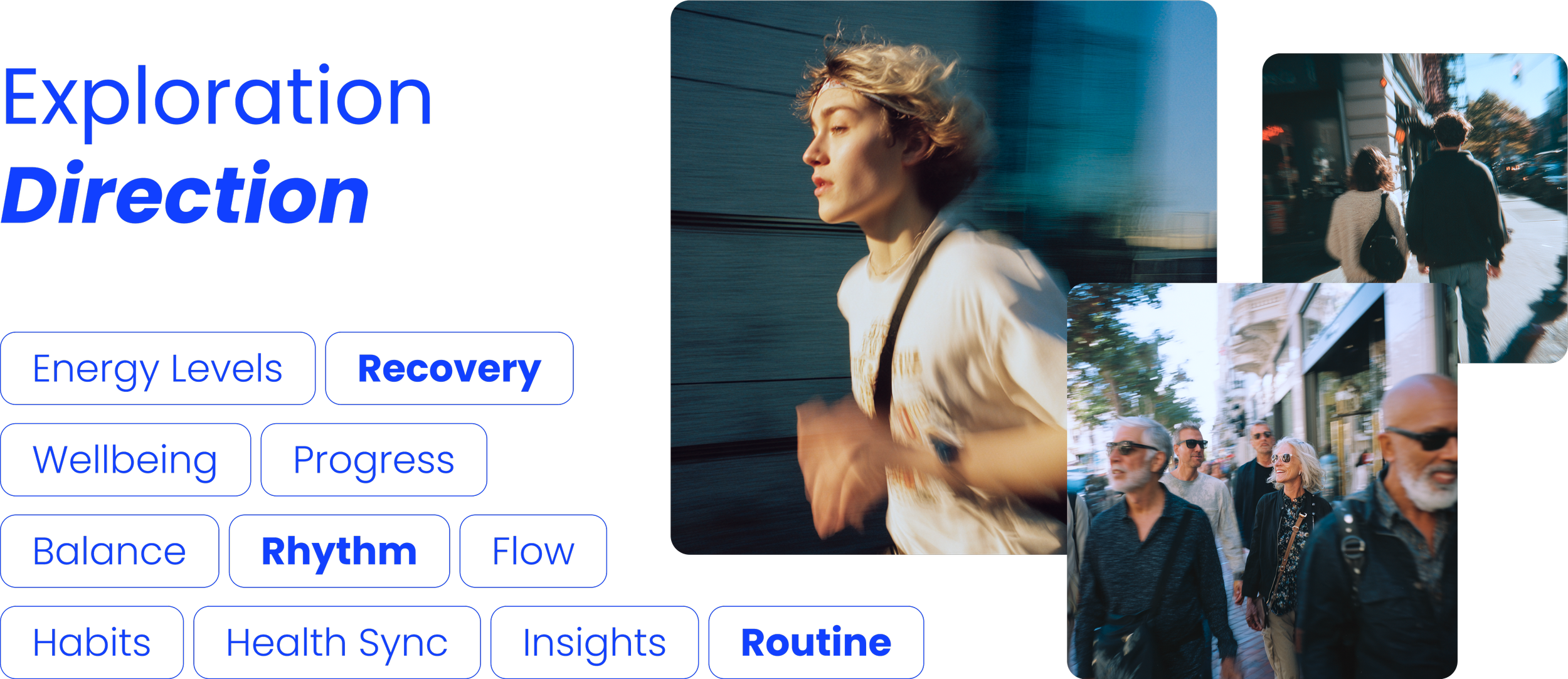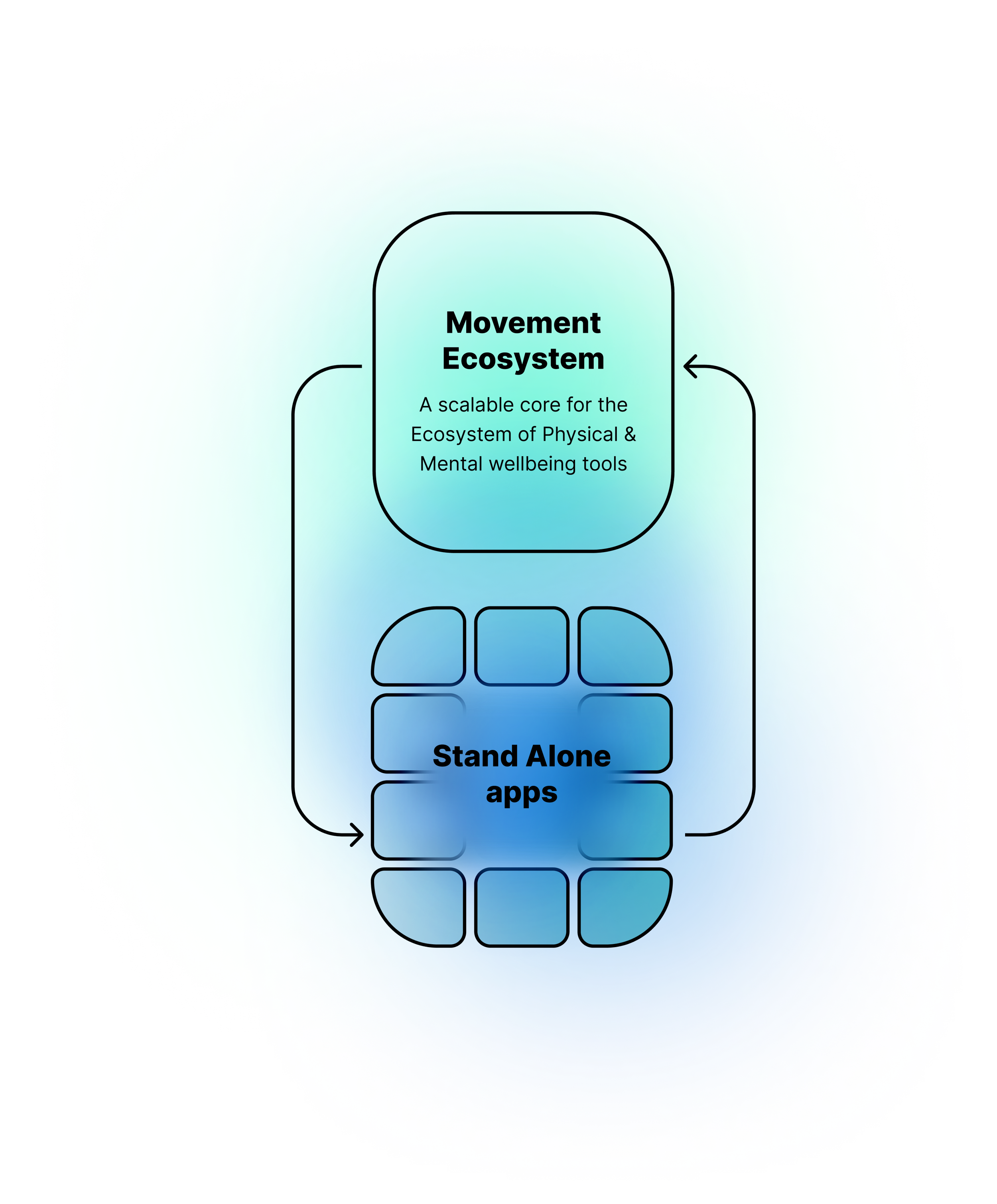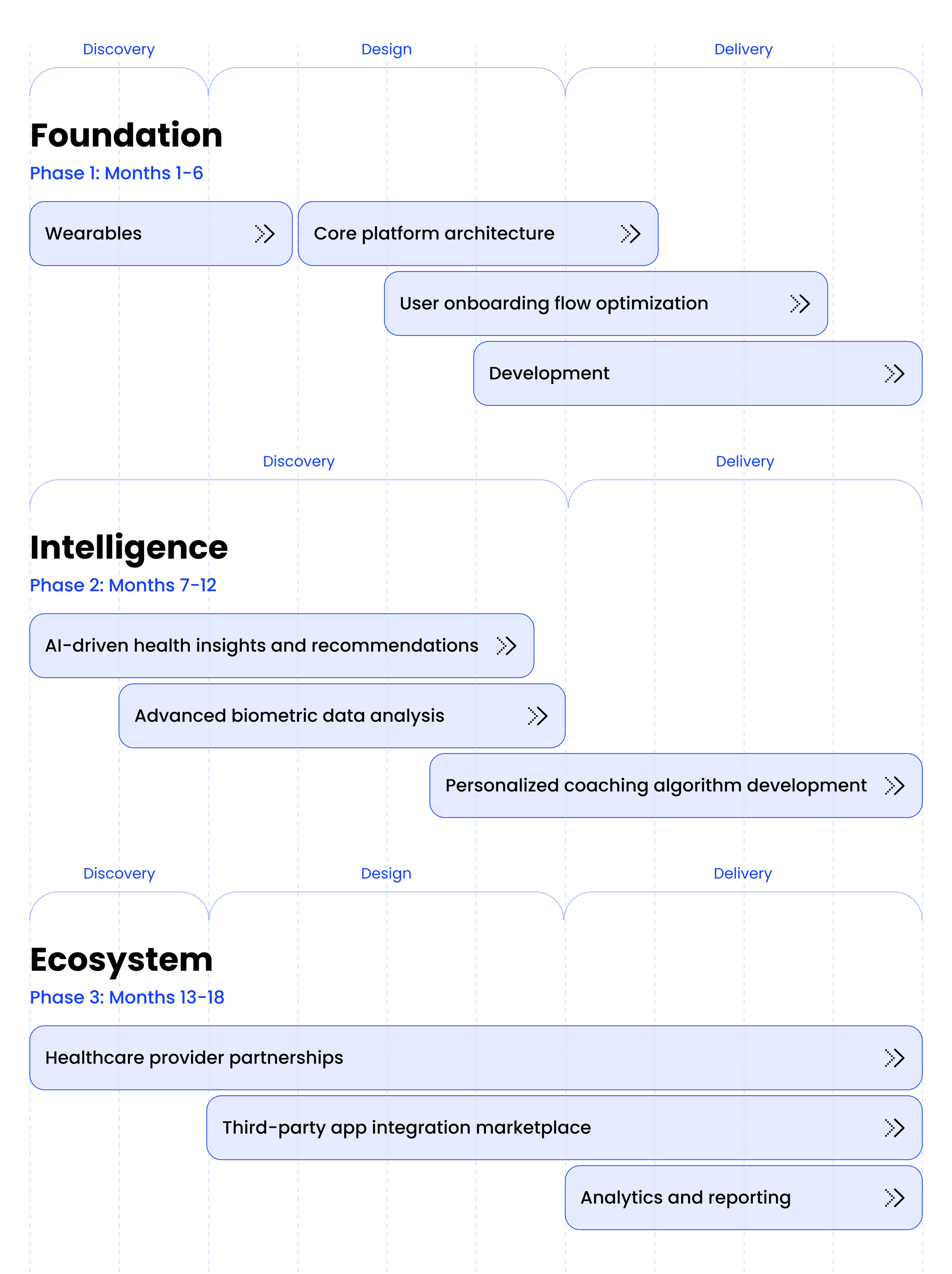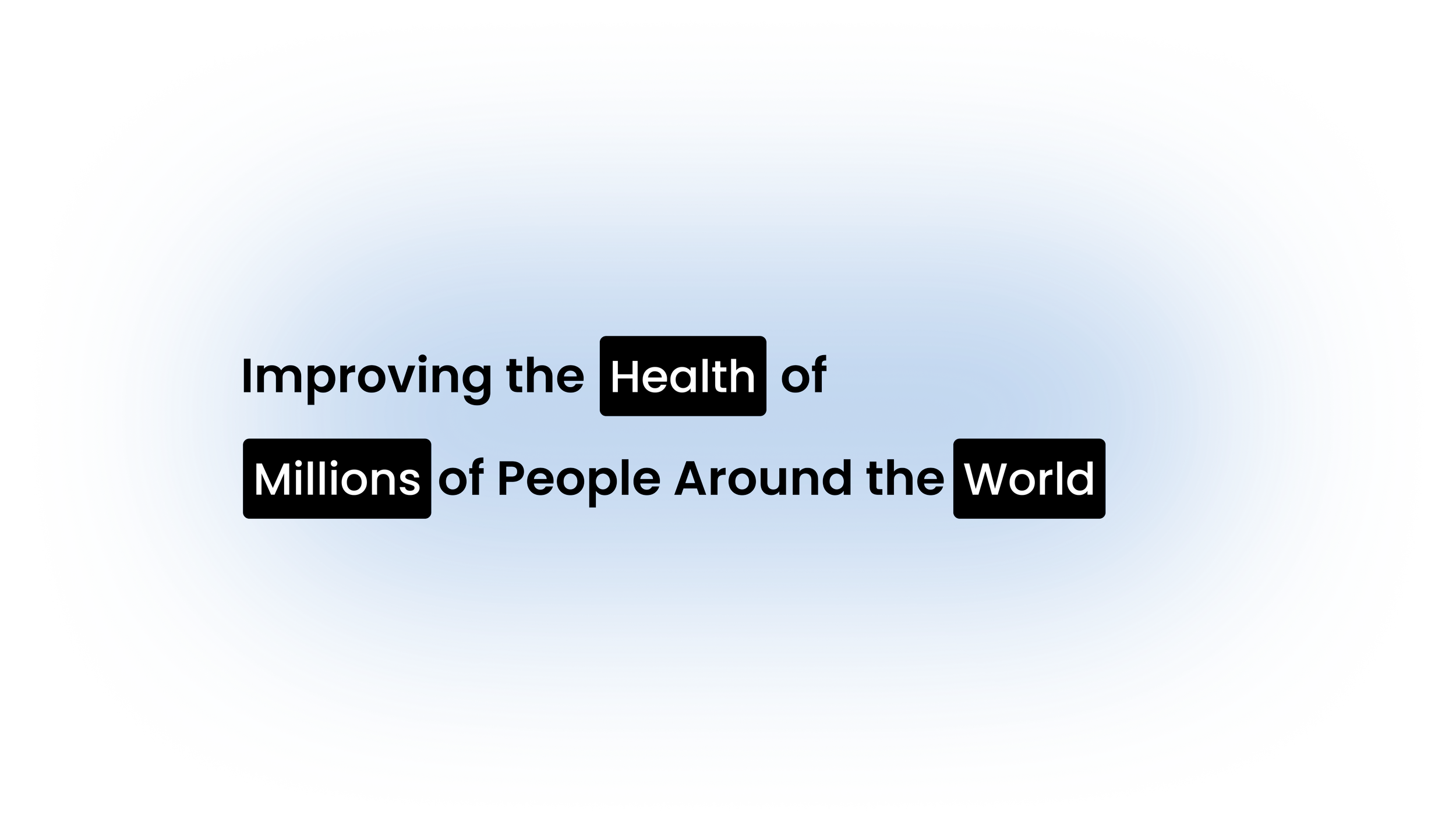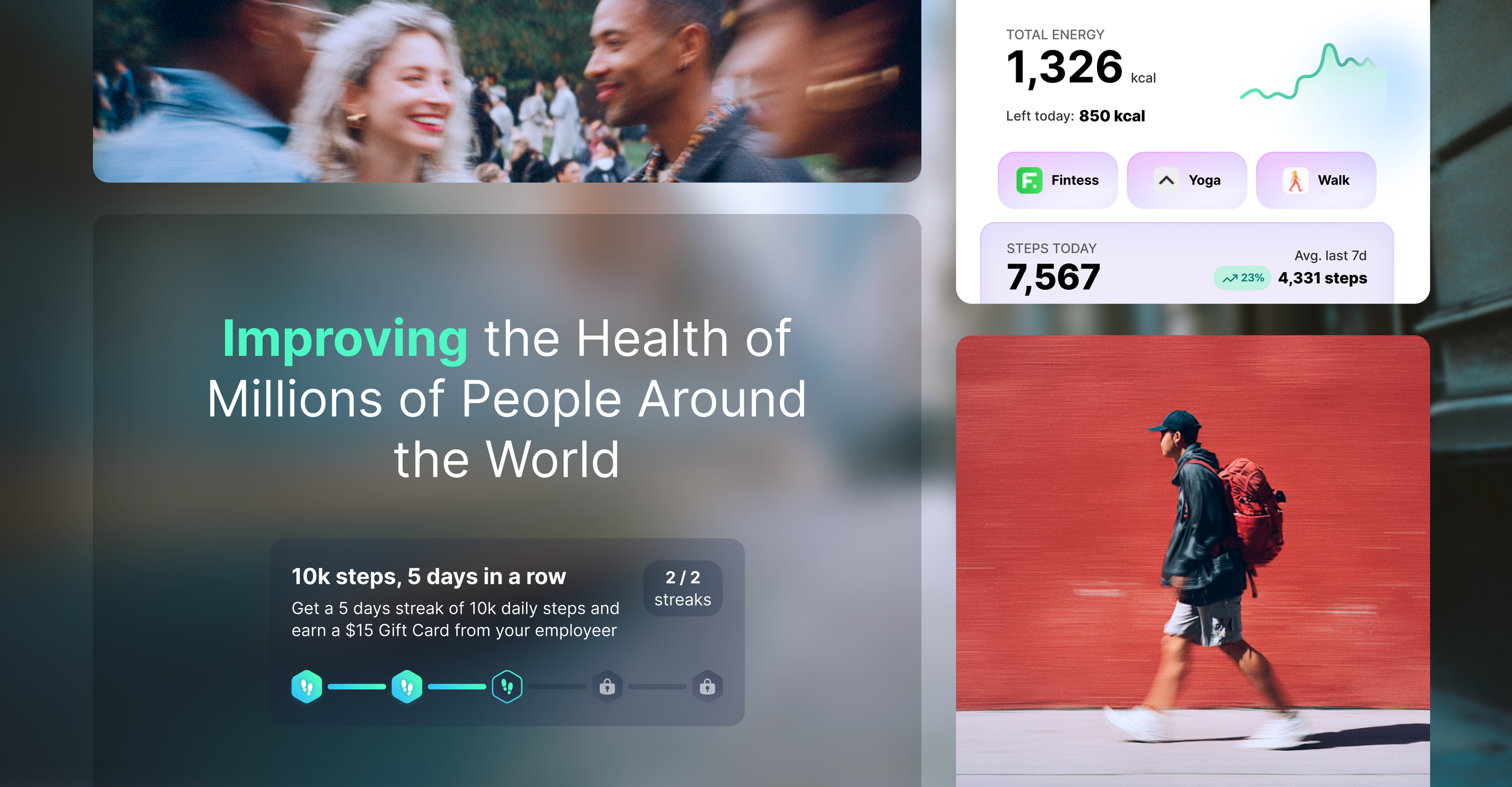Movement Ecosystem:
Designing a Comprehensive Wellness Platform Strategy
Sweatcoin is a Health & Fitness app that turns steps into currency, using rewards and gamification to drive user activity and retention with 150M+ users
Details
Project link
Check in App Store
Industry
Health & Fitness / B2C
Role
Design Director
Executive Summary
| Role | Design Director |
| Team | Cross-functional strategy team: CEO, CPO, 6 Product Owners, 7 direct reports: Product Designers |
| Timeline | 4 months strategic exploration phase |
| Business Impact | Identified pathway to transform standalone health apps into integrated ecosystem serving 150M+ users, positioning for ecosystem-driven revenue growth |
| Key Decisions | Comprehensive market analysis, behavioral segmentations, ecosystem architecture design |
The Strategic Challenge
Our company had achieved significant scale with 150M+ users across 2 main products over 9+ years, but it faced fundamental growth limitations operating in standalone silos. Despite strong user engagement, it was missing opportunities to create deeper value and sustainable competitive advantages.
The core challenge
Fragmented user experience: Users sought holistic wellness but received disconnected point solutions
Limited monetization depth: Standalone apps hit a natural ceiling for lifetime value
Competitive vulnerability: Easy for competitors to replicate individual features
Market evolution mismatch: 2024 wellness trends demanded integrated, personalized experiences
Key market insights
Healthcare system global crisis creating demand for preventive solutions
Rise of neuroscience and behavioral science in consumer wellness
Data-driven personalization is becoming essential
Growing audience sophistication around holistic health approaches
Leadership Approach
As a Design Director, I reframed this from feature roadmap planning to fundamental business model evolution:
Built Strategic Alignment
Cross-functional leadership: Collaborated with the strategy team, spanning the CEO and individual product owners
Stakeholder engagement: Led trend research and strategic planning across business directions
Implementation planning: Translated high-level vision into an actionable roadmap
Navigated Market Complexity
Trend analysis: Synthesized 2024 wellness landscape including emerging technologies and user behaviors
Competitive positioning: Identified white space between existing health apps and comprehensive platforms
User research integration: Connected market trends to actual user needs and behaviors
The market isn't asking for better step counting.
It's demanding a holistic wellness platform, a comprehensive health ecosystem
Established Design Principles for the Ecosystem
Built cross-functional alignment
Holistic integration — Physical and mental wellness as an interconnected system
Behavioral stickiness — Focus on habit formation over feature engagement
Scalable personalization — Data-driven insights enabling individualized experiences
Professional validation — Clinical backing for credibility and efficacy
Wellness, Health and Fitness trends research
The ecosystem strategy required comprehensive market and user validation. Working with business development and research teams, we quantified the ecosystem opportunity:
Healthcare system global crisis
Healthcare systems face crises globally due to a confluence of factors: rising demand, insufficient resources, outdated infrastructure, and limited accessibility. These challenges underscore the need for comprehensive reforms to ensure sustainable and inclusive healthcare for all.
Resources:
Harvard Business Review | Bloomberg Businessweek | The Economist
The rise of neuroscience and behavioural science popularization
The topic is surging on social media, notably through podcasts, enjoying a newfound popularity. Audiences are growing, reflecting a rising interest in understanding the mind.
Resources:
Huberman Lab | The Drive Podcast with Peter Attia | TPH with Dan Harris | Glucose Goddess by Jessie Inchauspé
Data-driven approach
Wearable devices like the Apple Watch are becoming essential tools for health tracking. Since iOS 17, Apple has focused on Mental health features and cardiovascular health.
A growing interest in personalized health monitoring has increased the use of continuous glucose monitors(CGM) among health-focused folks to gain insights into metabolic health.
Resources:
iOS 17 Health – two big changes | Tracking My Blood Sugar
Key Strategic Decisions
Ecosystem Architecture Over Feature Addition
Decision: Designed an integrated platform connecting body, mind, technology, and healthcare rather than adding standalone features
Structure:
Core platform: Movement tracking as the central nervous system
Connected experiences: Mindfulness, rewards, healthcare, and technology integration
Progressive complexity: Entry-level to advanced user pathways
Business Value:
Created a defensible competitive moat through integration complexity
Enabled cross-product user journey optimization
Established foundation for multiple revenue streams
Behavioral Segmentation Strategy
Identified the highest-value segment as the primary growth opportunity
Revealed product-market fit gaps in existing offerings
Enabled targeted development and marketing strategies
Healthy Habits Enthusiasts
Who are they?
New Year’s Resolution folks
Intentions:
start a new life after Xmas. Set an ambitious goal for yourself
Market: well-established
Solutions: plenty of apps
Resources:
Why Most New Year's Resolutions Fail
Huberman Husbands
Intentions:
live a longer, healthier, more fulfilling, productive life without chronic disease
Market: empty for now but not for long
Solutions: not released yet
Resources:
What Is A TikTok Huberman Husband
People in a Pivotal Moment
Intentions:
realising the vital changes that should be done to a lifestyle before it's too late
Market: not established
Solutions: mainstream healthcare
Resources:
NHS Prevention Programme
Healthy People 2030
Technology Integration Framework
Decision: Built platform architecture supporting wearables, smart devices, and health monitoring tools
Integration Points:
Smart scales and CGM tracking for metabolic health
Blood pressure monitors and smartwatches for cardiovascular data
Meditation and breathing apps for mental wellness
Healthcare provider connections for professional oversight
Outcome:
Positioned platform as central hub for health data aggregation
Created a sticky ecosystem through device integration
Enabled AI-driven personalization and health predictions
Stickiness-First Design Philosophy
Decision: Prioritized long-term behavioral change over short-term engagement metrics
Core Principles:
Reward-driven wellness: Positive reinforcement for healthy actions
Small steps, big impact: Sustainable habit formation approach
Heart-centered insights: Stress pattern recognition through biometric data
Community health support: Social accountability and shared goals
Data-driven decisions: Transform daily actions into health insights
Business Value:
Higher lifetime value through sustained engagement
Reduced churn through habit integration
Premium positioning through behavioral science approach
Motivational drivers
New Year’s Resolution folks
New life | New meMain motivation:
Craving for self-improvement, personal growth and make positive changes
Commitment level: ✦✧✧✧✧
Deep-core driver: dissatisfaction
Fears: intimidated by a new unknown process and uncertain about steps
Huberman Husbands
BiohackingMain motivation:
Want spend less efforts on manually gathering their data from different sources in Google Sheets and analysing it
Commitment level: ✦✦✦✦✧
Deep-core driver: self-improvements
Fears: not a user-friendly interface that doesn’t track all they want
People in a Pivotal Moment
Life threatening conditionsMain motivation:
Healthcare professionals underscored the level of the health issue. Ready for commitment to making the necessary changes
Commitment level: ✦✦✦✦✦
Deep-core driver: desire to live
Fears: a threat to life, fear of death
Organizational Impact
This strategic exploration transformed how the company approaches product development and market positioning.
Before Strategic Work
Separate product teams working in isolation
Feature-driven development without overarching vision
Limited cross-product user journey consideration
Reactive approach to market trends
After Ecosystem Strategy
Unified product vision driving all development decisions
User journey optimization across the entire platform
Proactive market positioning in emerging wellness categories
Strategic framework for future product decisions
Specific Organizational Changes
Product roadmap realignment: 2024 planning now follows ecosystem principles
Team structure evolution: Cross-product collaboration increased 3x
Investment focus: R&D budget redirected toward integration technologies
Market positioning: Company messaging shifted from "fitness app" to "wellness ecosystem"s
Users aren't collecting data for fun. They want personalized insights. Clinically-based recommendations. And no platform is connecting the dots
Market Opportunity Assessment
Working with business development, finance and data teams, we quantified the ecosystem opportunity:
| Cohort | Revenue Model | Active Users’ Lifecycle | Northstar Metric |
|---|---|---|---|
| New Year’s Resolution | Freemium | 2 months | DAU |
| Huberman Husbands | Premium subscriptions | 4–8 months | Retention |
| Pivotal Moment | B2B / Healthcare Providers | 3–12 months | Behaviour Changes |
Key insights
Huberman Husbands represent the highest value: 4-8 month engagement cycles, subscription model fit, data-driven preferences
Integration gap opportunity: No existing platform offers seamless health data aggregation with personalized insights
Professional validation demand: Users increasingly seek clinically-based health recommendations
Strategic Implementation Roadmap
Research & Validation Investment
Research Components
Market trend analysis across health, technology, and behavioral science sectors
Competitive landscape mapping of 20+ wellness platforms
User journey analysis across the existing 150M+ user base
Technology feasibility assessment for integration requirements
Business model validation through industry benchmark analysis
Strategic Partnerships
Wearable device manufacturers (Apple, Fitbit, Garmin)
Health data platforms (HealthKit, Google Fit)
Healthcare providers and telemedicine platforms
Behavioral science research institutions
Design Implementation:
North-Star Concepts
Following the strategic exploration, I led the translation of ecosystem principles into a concrete design vision through comprehensive concept development.
Historical Pain Points
Pre-2019: Tech-oriented approach, poor readability, weak brand identity
2021-2023: Performance issues, design inconsistencies, experimental approaches lacking cohesion
2024: Overly gamified UI, users seeking personal insights over entertainment
Key Strategic Decision: Modular Bento Grid Selection
Decision Rationale
Ecosystem enablement: Modular approach supports diverse feature integration
Personalization capability: Enables customization and A/B testing across user segments
Future scalability: Adaptive design accommodates evolving user preferences
Technical flexibility: Facilitates rapid feature updates and ecosystem expansion
Implementation Strategy
Transitional Design: Immediate improvements with swipeable circles and expandable sections
North Star Vision: Long-term modular system for comprehensive ecosystem evolution
Design-to-Strategy Alignment
The chosen structural design directly supports ecosystem strategy:
Modular components enable seamless integration of health tracking, mindfulness, and healthcare features
Adaptive layouts accommodate different user personas (New Year's, Huberman Husbands, Pivotal Moment)
Data visualization flexibility supports personalized insights and professional-grade analytics
What This Taught Me About Design Leadership
This project exemplified my approach to product leadership: connecting strategic market insight to concrete design execution, building systems that outlast individual features, and creating sustainable competitive positioning.
Key Strategic Principles Applied
Market-driven vision: Connected emerging trends to business opportunity and design decisions
User-centered segmentation: Identified the highest-value target personas and designed for their specific needs
Integration-first architecture: Built both business model and design system for ecosystem thinking
Behavioral design foundation: Prioritized sustainable engagement through modular, personalized experiences
Early validation: Test modular design concepts with target user segments before full commitment
What I'd Approach Differently
Cross-platform consideration: Ensure the design system works across ecosystem touchpoints from day one
Performance impact assessment: Evaluate the modular approach against app performance optimization
Design-development handoff: Create clearer implementation guidelines for engineering teams
The Movement Ecosystem strategy, combined with North-Star design concepts, positions the company to evolve from standalone health apps into a comprehensive wellness platform, with both the strategic framework and visual design system to support sustainable growth.
Bottom Line: This work transformed our approach from feature-driven development to ecosystem-driven design, creating a strategic and visual foundation for serving 150M+ users with integrated wellness experiences that drive user value and business growth.
Head of Design / SWEAT Wallet


